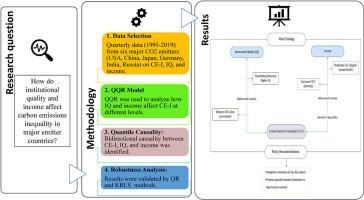制度质量和收入不对称如何影响碳排放不平等?对全球六大排放国的量化对量化评估
IF 9.7
1区 环境科学与生态学
Q1 ENGINEERING, ENVIRONMENTAL
引用次数: 0
摘要
碳排放不平等(CE-I)是实现可持续发展和社会公平的一个重大障碍,凸显了各国之间环境负担和利益分配的不平等。要有效解决这一问题,必须考虑制度因素和经济条件是如何造成这些差异的。本文研究了制度质量(IQ)和收入对CE-I的非对称影响,采用了1995-2019年全球六大排放国--中国、美国、德国、印度、俄罗斯和日本--的Quantile-on-Quantile回归(QQR)方法。通过 QQR 方法,可以详细研究这些关系在数据的不同量级上是如何变化的,从而提供超越传统回归模型的洞察力。研究结果揭示了一种非线性关系,即智商的提高通常会降低 CE-I,尤其是在治理薄弱的情况下;然而,在智商水平较高的情况下会出现收益递减。收入对 CE-I 的影响呈倒 U 型,经济增长最初会加剧排放不平等,但收入水平越高,影响越小。利用量级格兰杰因果检验、量级回归和基于核的正则化最小二乘法进行的稳健性检验表明,制度质量和收入水平在形成 CE-I 模式方面都发挥着重要作用。基于这些发现,建议采取具体的政策行动:在治理薄弱的情况下,政策应优先考虑加强智商以减少 CE-I,而在高收入国家,工作重点应放在促进公平的收入分配上,以管理增长与不平等之间的关系。有针对性的干预措施对于确保环境可持续性和社会公正以减少 CE-I 至关重要。本文章由计算机程序翻译,如有差异,请以英文原文为准。

How do institutional quality and income asymmetrically affect carbon emissions inequality? A Quantile-on-Quantile assessment for six major global emitters
Carbon emissions inequality (CE-I) represents a significant obstacle to achieving sustainable development and social equity, highlighting the unequal distribution of environmental burdens and benefits among nations. To address this issue effectively, it is important to consider how institutional factors and economic conditions contribute to these disparities. This paper investigates the asymmetric impact of institutional quality (IQ) and income on CE-I, employing a Quantile-on-Quantile Regression (QQR) approach applied to six major global emitters—China, the United States, Germany, India, Russia, and Japan—from 1995 to 2019. The QQR method enables a detailed examination of how these relationships vary across different quantiles of the data, providing insights beyond those of traditional regression models. The findings reveal a non-linear relationship in which improvements in IQ generally decrease CE-I, particularly in contexts of weak governance; however, diminishing returns are observed at higher IQ levels. Income exhibits an inverted U-shaped effect on CE-I, where economic growth initially increases emissions inequality but moderates it at higher income levels. Robustness checks employing quantile Granger causality tests, quantile regression, and Kernel-based regularized least squares demonstrate that both institutional quality and income levels play significant roles in shaping CE-I patterns. Based on these findings, specific policy actions are recommended: in contexts of weak governance, policies should prioritize strengthening IQ to reduce CE-I, while in high-income countries, efforts should focus on promoting equitable income distribution to manage the growth-inequality relationship. Targeted interventions are essential to ensuring both environmental sustainability and social justice in reducing CE-I.
求助全文
通过发布文献求助,成功后即可免费获取论文全文。
去求助
来源期刊

Journal of Cleaner Production
环境科学-工程:环境
CiteScore
20.40
自引率
9.00%
发文量
4720
审稿时长
111 days
期刊介绍:
The Journal of Cleaner Production is an international, transdisciplinary journal that addresses and discusses theoretical and practical Cleaner Production, Environmental, and Sustainability issues. It aims to help societies become more sustainable by focusing on the concept of 'Cleaner Production', which aims at preventing waste production and increasing efficiencies in energy, water, resources, and human capital use. The journal serves as a platform for corporations, governments, education institutions, regions, and societies to engage in discussions and research related to Cleaner Production, environmental, and sustainability practices.
 求助内容:
求助内容: 应助结果提醒方式:
应助结果提醒方式:


